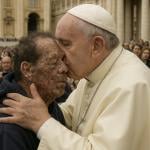Russell Shaw has an article at the Catholic World Report on Vatican II with the title Did We Really Need Vatican II? I think the question is a good one, and I wish I had time to ruminate on it at length. Unfortunately, I am on a research trip, and all I have time for at the moment is to post it and lament how lame and stereotyped his answer is. Contrary to many conservative Catholics, his answer is yes—for the opposite opinion, just read the comments on his article. His reason, however, is the evils of modernism and he summons four bogeymen to make his case:
The Church faced a grave problem then—indeed, it still does—and an ecumenical council was required to address it. What problem? No less than the crisis of modernity itself, especially the comprehensive undermining of humankind’s self-understanding and its disastrous consequences for faith, underway in the West for at least a century or more before the council.
This process had many sources, but three especially stand out: Darwinism—popularized evolutionary theory reducing the human person to no more than a higher animal; Marxism, whose deterministic account of history eliminated free choice; and Freudianism, no less deterministic, which explained human behavior as the acting out of sublimated impulses from libidinous realms of the psyche.
Capping it off was Friedrich Nietzsche, who boldly announced the death of God—the bourgeois deity of 19th century Christianity, that is—and predicted that a new morality of power vested in a superman (ubermensch) would soon emerge. Hitler apparently took that to heart.
Ordinary people were understandably slow in absorbing all this, but it was gospel for the Western cultural elites of the late 19th and early 20th centuries. In due course it filtered down to the masses—a process speeded by the horrors of two world wars. Here, then, was the crisis of modernity that Vatican II needed to confront.
I have read three of the four (for some reason I have never gotten around to reading Nietzsche) and have found a great deal of value in Marx and Freud, even when I disagreed with them. And Darwin laid the foundation for the modern theory of biology with a theory as encompassing as General Relativity was to modern physics. So I simply reject out of hand any simplistic reading of history that lays all the manifold problems of the world at their collective feet.
But moving on from this, I want to start a discussion on the original question: did the Church need an ecumenical council in the early 1960’s? If so, why? If not, what was the problem? I will tip my hand and say I think the Council was timely and important, but that is in many ways a visceral reaction: I know this is the case, but am having a hard time articulating why. So I am very anxious to read your thoughts.
















